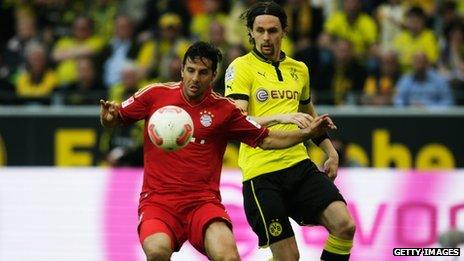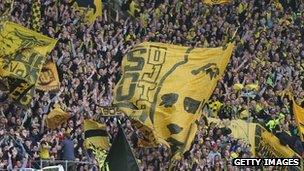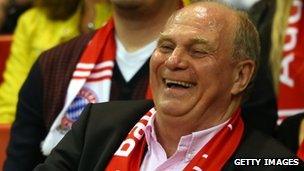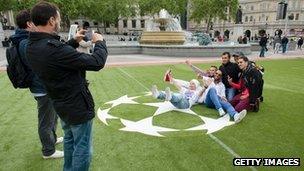German football model is a league apart
- Published

Bayern Munich (red) have won the European Cup/Champions League four times before and Borussia Dortmund once
Chancellor Merkel will be there. So will the 50,000 fans of Bayern Munich and Borussia Dortmund who've been lucky enough to get tickets the two clubs were allocated.
So may many more of the hundreds of thousands who failed to get tickets in the club ballots who bought them elsewhere. The German flag will fly vigorously over Wembley.
It can be said with certainty that German football will be the winner - on the field, obviously (you don't need to be clairvoyant to predict that a German club will win). But off the field, too.
The stylish way the two German clubs thrashed Barcelona and Real Madrid in the semi-finals seemed like a changing of regimes. Where the Spanish clubs once provided style and inevitable victory, the two German clubs triumphed with as much panache.
So the lights at Wembley will be on the way German football is organised.
Low ticket prices
Bundesliga clubs seem much like the rest of German business (and very different from clubs in the Premier League in England and Wales, for example).
They are not indebted to the point of drowning. They rely much more on incomes generated and then invested in the game.

Entry prices are generally cheaper at top-flight German clubs than in England and Wales
Above all, they are clubs, in the legal sense of being formally constituted associations with members who elect officials.
Ticket prices are low. In the Bundesliga, the average price for the cheapest tickets is just over £10. In the Premier League, fans pay upwards of £28.
For a season ticket, it averages £207 in Germany's top-flight games compared with £468 in England.
At Bayern Munich, you can get in (albeit to stand) for £12. Fans of Borussia Dortmund pay £9 to get into the south stand and form "Die gelbe Wand" - the "yellow wall" of colour from the club's shirts and scarves.
Contrast those prices with £30 at the cheap end in Manchester United or Real Madrid.
This is a matter of policy.
'Member-owners'
When Uli Hoeness, the president of Bayern Munich, was asked why the club didn't have higher ticket prices, like they do in England, he said: "We do not think the fans are like cows to be milked. Football has got to be for everybody. That's the biggest difference between us and England."
German clubs are organised in a very different way from British clubs.
In the Premier League, assorted billionaires own the top clubs (Manchester United - the Glazer family; Manchester City - Sheikh Mansour; Chelsea - Roman Abramovich).
In Germany, there is the "50 + 1" rule, whereby the association or club has to have a controlling stake, commercial interests can't gain control, In Bayern Munich, for example, Audi and Adidas each own 9% but the rest is controlled by the members via the club.
There are two exceptions: Wolfsburg is owned by Volkswagen and Bayer Leverkusen is owned by the chemical company, Bayer - both clubs originated as works sporting clubs. But generally a club in Germany is a true club for the members.
So if you ask fans outside a Bayern game who owns the club, they are incredulous: "The members, of course", they say.
Sponsorship
The members elect the president, in the case of Bayern, Uli Hoeness, who retains great respect despite being investigated over his tax affairs.
He, as a legendary Bayern and Germany player, uses his name to draw in sponsorship. With lower incomes from tickets, German clubs tend to put more weight on sponsorship deals - the magnificent Allianz Stadium in Munich is an example.
In 2011, the total revenue for Bayern was 368m euros (£300m), not that far below that of Manchester United with 395m euros (£320m).

Uli Hoeness is a former Bayern Munich playing legend turned president of the club
But the German club got 55% of its revenue from commercial deals with companies compared with 37% from that source for Manchester United. British clubs tend to get a bigger slice of their income from the fans.
German clubs tend to form close associations with local firms, which often turn out to be big global companies.
Carlo Wild, the chief reporter of Kicker football magazine, told the BBC that Bayern Munich uses the appeal of the big former football stars who have been elected by the fans to run the club.
He says: "Uli Hoeness, the president, is the man who has the connections. The name of Franz Beckenbauer - the Kaiser - is also very important. And he opens doors, but Uli Hoeness is the man who acquired the companies, the sponsors."
German clubs - just like the rest of German business - tends to be phobic about debt.
Long-term thinking
Many Premier League clubs run at a loss. Most Bundesliga clubs run at a profit. The difference is in the way German clubs keep costs down.
According to Twentyfour7 Football magazine, Bundesliga clubs made a profit of £47m last season while the Premier League made a loss of £207m, even though the income to the British league was higher (£2.4bn) than to German clubs (£1.78bn).

The Wembley final is a showcase for German football
But in the Bundesliga, it said, wages were 38% of the clubs' revenue while the in Premier League it was 67% (and as high as 93% in one English case).
German clubs do buy stars. To add spice to the final on Saturday, Bayern Munich recently bought Borussia Dortmund midfielder Mario Gotze for a reported €37m (£31.5m).
But they also groom youngsters who increasingly come up through the system.
On Saturday, two German teams will be on show. But also an off-the-field model of sports organisation - a model which treads carefully, building relationships, thinking long-term.
A bit like the rest of German business really.